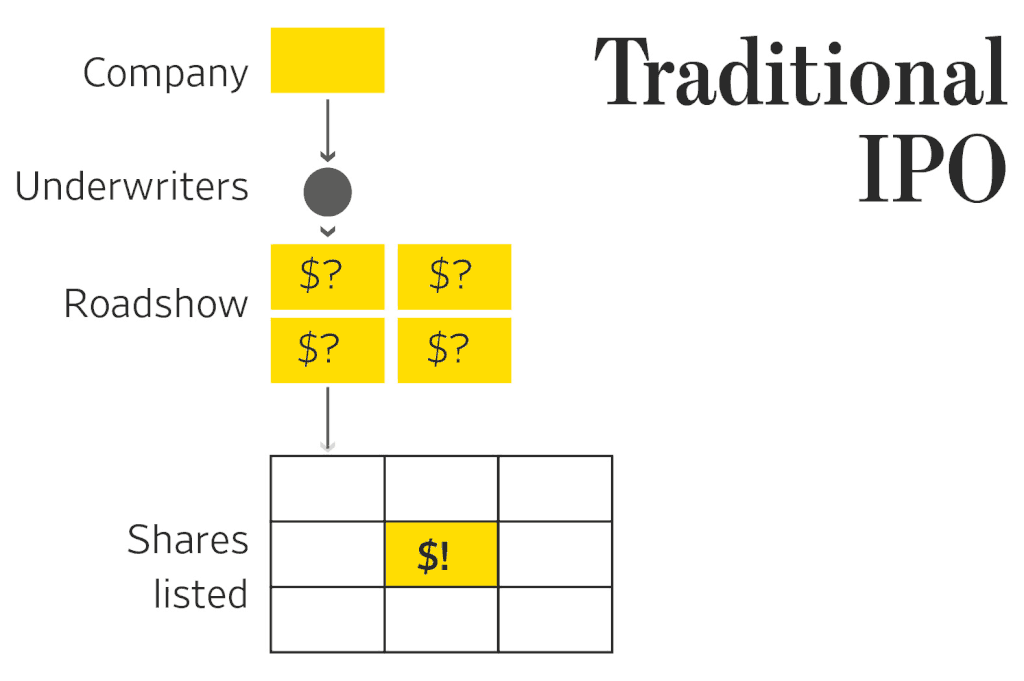Happy Thanksgiving to our readers in the United States! The markets were closed in the US today, so there’s no major news coming in from Wall Street. Here in Canada, here’s what caught our eye:
Direct Listing is the New IPO
One way to think about the IPO is not as a scam that sells “community-adjusted EBITDA” and overpriced shares. You could think about it as the way companies mature and enter the public marketplace, saying to the world: you decide how much we are worth.
But IPOs aren’t the only way to do that, for direct listings have gained popularity recently, with Slack and Spotify setting precedent. What’s more, is that the NYSE agrees.
The exchange submitted a proposal to the SEC that would allow companies to go public via direct listing and raise capital. This move is a proposal to essentially allow companies, not merely existing shareholders, to sell shares on the public market.
Imagine you own a corporation that has 100 shares. You hire an investment banker to sell some to a hedge fund, some to a pension fund, and then some to a wealth fund. Say you get a total of $200 for your 100 shares. You have an IPO, the company goes public, and then you have sold $200 worth of stock. Doesn’t mean your company is actually worth $200.
Let’s say the market doesn’t believe in you and your shares start trading for fifty cents. Suddenly, you are worth $50, even though your early investors bought in at a $200 valuation. But now, they are tied up and can’t sell their stock until the lock-up expires.
In a direct listing: your bank underwriting the stock just says, we have 100 shares to offer for this entire company. The market opens, shares trade freely without the hassle of a lockup, and the market determines the valuation of your company from day one. It’s good for early investors who might want an “exit”.
In the new model proposed by NYSE, the idea is that you could that, but you could also just raise capital directly. Instead of going to the investment bank, you could say: hey, we want more money because we are running out of cash and so we will sell 10 more shares on the market. The price? The market will decide. So in addition to your 100 shares, the company just announces that it is issuing more 10 more shares of stock that anyone is free to buy at whatever price.
This is an oversimplification, and there are merits and demerits to both the IPO and the direct listing, but I hope you get the gist of what the NYSE proposes. I don’t think this will mean that investment banking will be done away with, because firms will still need some sort of guidance, and then the banks would make their money in advisory fees.
The world of venture capital investment would be more inclined to such a business model, not simply because it eliminates the fat fees investment bankers make from underwriting the stock, but would also do away with the lock-up period that in many instances is a bane. Take Uber or Lyft for instance, when shareholders were hurt badly after the lockup ended, and they decided to cut their losses and flooded the market with shares, driving the price down even further.
All of this is contingent on the SEC saying yes, but if they do, public markets would either become more transparent as companies go public, or they will become the new private markets where investors ride the hype wave, but to a greater degree – for instance, Beyond Meat. Speculation will still drive prices but now it will have a much more significant impact as the stock will be more liquid from earlier rather than later.
Let’s see what the government says.
India’s Troubles
The Indian economy is going from bad to worse as the Prime Minister is running out of options to reduce the fallout.
Friday is a major day, for the country will release its key economic data that might reflect its weakest performance in the last quarter since in more than six years. Estimates are that the country’s growth rate will drop below the 5% mark, a culmination of a slowdown in manufacturing and reduced consumer spending.
In the background, the country is haunted by toxic corporate debt that no one is willing to touch and rampant corruption in the public sector that is adding fuel to the fire.
The central bank is already on the road to quantitative easing as interest rates have been by 135 points, their lowest since 2009. Indian markets touched all-time highs this week as traders are optimistic about more tax cuts and easing that will lead to greater returns.
Like the US, India is no stranger to the game of political economy and the country’s finance minister Nirmala Sitharaman is keen to look at India’s economic data not as a function of economic activity, but as a direct result of the government. It’s an entirely separate question about whether or not that is true.
Friday will tell us whether Modi’s magic that won him the election has also improved the economy. Hope you enjoyed your Turkey!
What we’re talking about
-
China blockchain craze reminiscent of ours in 2017, and scams abound
-
Empower Clinics ($CBDT.C) expands sales force to service California CBD market
-
Israeli based Isracann Biosciences ($IPOT.C) plays the game by the rules and reaps the rewards
-
Defense Metals ($DEFN.V) tags highest grade drill intercept to date at Wicheeda REE deposit

